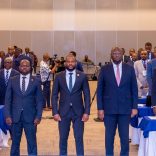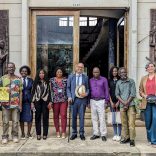Mozambique targets universal access to drinking water by 2029
Listen: US offers resources to help ‘contain, degrade and defeat’ Mozambique insurgency – VOA

File photo: United States State Department
A top U.S. counterterrorism official has expressed concern about the deteriorating situation in Mozambique, where an Islamic State-affiliated terror group has captured territory in the country’s northeast since appearing three years ago.
The group’s actions have led to the displacement of more than 400,000 people and the deaths of more than 2,000 in the Cabo Delgado region. The conflict has recently spread to neighbouring Tanzania, raising the potential of destabilising part of southern Africa and boosting a group with declared ties to the Islamic State.
.@StateDeptCT Amb Sales: This trip to southern Africa was to garner support on increased counterterrorism efforts. #AFHubPress
— US Africa Media Hub (@AfricaMediaHub) December 8, 2020
Ambassador-at-Large Nathan Sales, the U.S. coordinator for counterterrorism, recently visited Mozambique and South Africa to see how the United States can help “contain, degrade and defeat” the growing movement. With a situation this complicated, he said, a military solution is not enough. He spoke to reporters via teleconference from Washington on Tuesday.
“In addition to the security challenges posed by ISIS actors there, we also have the knock-on consequences from a humanitarian standpoint with, you know, hundreds of thousands of Mozambican citizens fleeing the violence,” he said using an acronym for the Islamic State terror group. “And so, part of the response has to include meeting that humanitarian need. We have to get the security situation under control so that people feel comfortable and safe returning to their homes, returning to their lives.”
AVAILABLE NOW: English and Portuguese audio files from today’s tel press briefing with @StateDeptCT Ambassador Nathan Sales. Ambassador Sales discussed his recent trip to southern Africa and ongoing U.S. counterterrorism efforts in Africa. Access here: https://t.co/lArNyo63dy
— US Africa Media Hub (@AfricaMediaHub) December 8, 2020
Alex Vines, director of the Africa program at London-based think tank Chatham House, said there are several reasons the world is paying attention to this small corner of Africa. For one, Cabo Delgado has vast, still untapped oil and gas deposits estimated to be worth $60 billion. Instability has prevented those from being developed.
And, he adds, the group is getting bolder – helped by the failures of the Mozambican government.
“So, there’s local grievance, there’s real frustration that the Mozambican state, and the party of government in particular, has not delivered,” he told VOA. “So, disenfranchised frustrated young people. And I think also that the impact of the cyclone last year in the far north there, so Cyclone Kenneth, that the poor humanitarian response also drove people into becoming more sympathetic to this insurgency.”
Sales was vague about the outlines of the U.S. plan.
“What we need to do is make sure that we in the United States are making available to our Mozambican partners every capability that we have to help them degrade and ultimately defeat that terrorist threat,” he said. “Once we have reached an agreement on what our partnership could look like the precise contours of what that partnership could look like, I’m sure we’ll be in a position to share more information about what that will look like.”
.@StateDeptCT Amb Sales: The Govt of Mozambique is taking this treat very seriously. They recognise that the U.S. is in a position to assist with training and equipment to help counter this threat. #AFHubPress
— US Africa Media Hub (@AfricaMediaHub) December 8, 2020
The U.S. is not the only outside party trying to intervene. This week, Pope Francis donated $121,000 to support victims of militant attacks in Cabo Delgado. Those funds will be used to build health facilities for the displaced.
And, Vines noted, mercenaries with the shadowy Wagner Group arrived in Mozambique in late 2019 to help Mozambican security forces. Top U.S. military officials have echoed analysts who believe the Wagner Group is closely connected to the Kremlin, a charge Russian officials have denied.
Mozambique has also been in talks with Britain and neighbouring South Africa for possible support in combating the militants.
.@StateDeptCT Amb Sales: ISIS-affiliated groups do not respect national boundaries and they do their best to exploit national borders. #AFHubPress
— US Africa Media Hub (@AfricaMediaHub) December 8, 2020
Sales added that he believes the U.S. has a strong track record in fighting terrorism and rebuilding societies, and has a strong role to play in Africa.
“We’ve been doing it for 20 years,” he said. “And I think there’s a recognition on the continent that if you want to do it right, you’ve got to work with the Americans.”













Leave a Reply
Be the First to Comment!
You must be logged in to post a comment.
You must be logged in to post a comment.